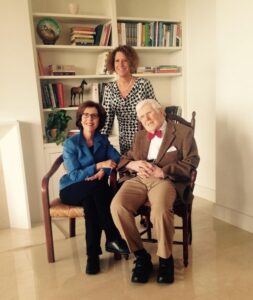By Lisa Muchnick Pote, MSW, Beck Institute Executive Director
We lost a giant in the field of psychotherapy early this morning when Dr. Aaron T. Beck passed due to natural causes. He was 100 years old.
I’m noticing that with his loss, I’m having a hard time describing the impact that the “Father of Cognitive Therapy” has had on the world. You can instead read about that here. But I am comforted by the condolences we’re receiving … in many ways, your words fill the gaps.
Most people reading this have been influenced by Dr. Beck, either professionally or personally, or both. Not just by Cognitive Therapy, also known as Cognitive Behavior Therapy (CBT), which he developed over 50 years ago, but by the man and mentor he was.
Without a doubt, the world is a better place because he recognized the importance of asking, “What was going through your mind?” while in session with a patient who was experiencing negative emotion. This question led him to conceive the theoretical basis of CBT, the Cognitive Model; that one’s perception of situations is more closely tied to one’s reaction than the situation itself. The Cognitive Model also informs Dr. Beck’s recent passion: his development, with his team at Beck Institute, of Recovery-Oriented Cognitive Therapy (CT-R) for individuals with serious mental health conditions.
In short, Dr. Beck led not only a 100-year life, but a life that transformed mental health worldwide.
As the Executive Director of Beck Institute, I have had the unique opportunity to learn about CBT from the source and apply that learning in our transformational work. Dr. Beck co-founded our organization in 1994 with Dr. Judith Beck, his daughter and an eminent CBT psychologist and educator in her own right. Since then, we’ve flourished as an organization, carrying out their vision for fostering excellence in CBT worldwide.

I remember the first time I met Dr. Beck. I was hired in 2015, almost 25 years after I got my MSW. I did not meet him until two weeks after I started. Like many of you who can remember meeting him for the first time, I was so nervous! The truth is, I had never engaged in clinical practice; my work focused on leading broad systems change. So, what did a non-clinician talk about with the world’s leading psychotherapist?
We chatted a bit over lunch, and then he asked me a simple question. “So, Lisa, what do you know about CBT?” I literally stopped the fork headed to my mouth, trying to think quickly for the best answer. Let me tell you, I had a series of “not good enough/unworthy” automatic thoughts in response to that!
I internally flipped through some answers and, instead of evading, decided to be honest. “I don’t know very much about CBT, Dr. Beck. You were in a chapter that was part of a class that was part of a course I had some 20 years ago. And I did read some of Judy’s book to inform my interviews, but … honestly, not much.”
I waited for his response, which only took a moment. “Well. The really important thing is, what are you going to do for Beck Institute?” In typical Dr. Beck style, he quickly pivoted the conversation and found something we had in common. That was everything to me and told me so much about his willingness to try on new ideas in the moment. He suggested taking Beck Institute’s CBT trainings to other cities, and we both became very excited about the new online courses we had planned to help BI fulfill its organizational mission. The rest, as they say, is history.
Dr. Beck was a role model for us all at Beck Institute. He continued writing, meeting colleagues, and collaborating with our team until his death. His incredible dedication will continue to inspire us all.
In an age where mental health challenges impact so many individuals around the world, there is always more work to be done. We will continue Dr. Beck’s work, embracing the tough fights as he did, and steward his legacy for years to come.
Rest in peace, Dr. Beck. The world will miss you.
Lisa